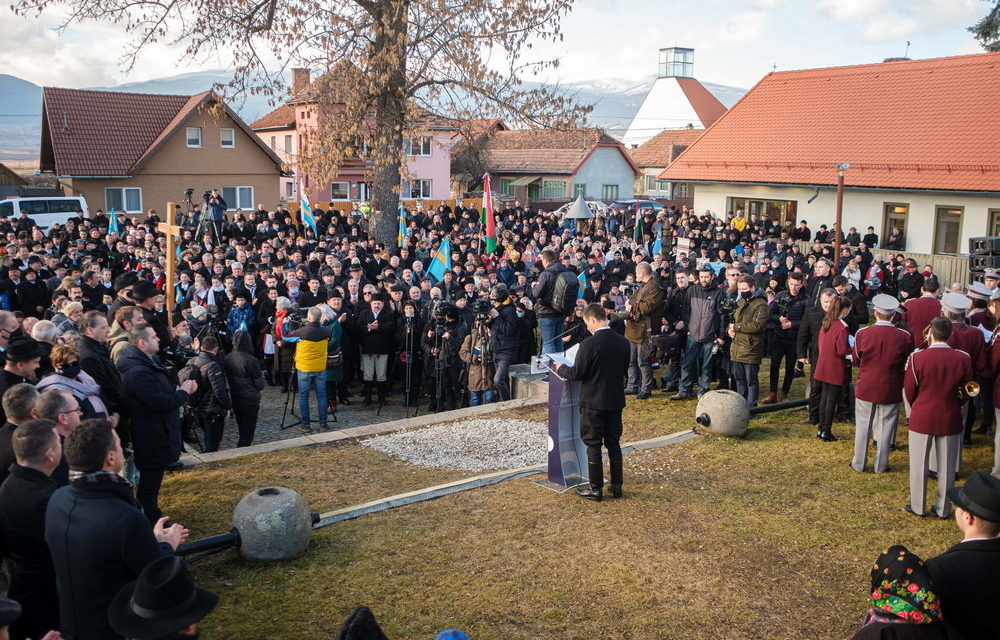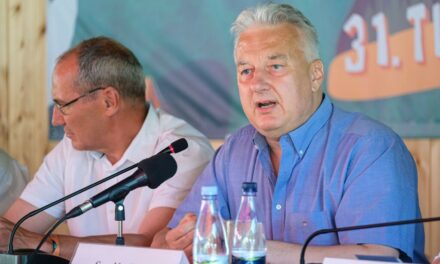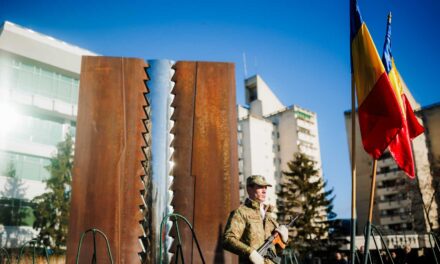The massacre of the Habsburg imperial army was commemorated on Friday in Madéfalva in Székelyföld on the 258th anniversary of the tragic event.
At the commemoration held at the Siculicidium monument, Levente Magyar , the Parliamentary State Secretary of the Ministry of Foreign Affairs and Trade, spoke about how the common goals of the great powers who wanted to be Hungarian over the centuries were the occupation, erasure of the past and identity, intimidation, assimilation or expulsion. But their common feature is that they all "lost their teeth in the experiment" and "dug their graves here, in the Carpathian Basin".
He added: "Don't hurt Hungarians!" password, not a terrified plea, but an ominous warning. "Don't hurt Hungarians, because you are playing with your life!" - said the state secretary, who said that "the moment of reckoning and truth, even if delayed, will always come".
He believed that Brussels and its invisible allies "have taken it into their heads that they are hanging an ideological and political yoke on us". "Let's take them around the cemetery where the once world-beating empires that fell into the subjugation of Hungarians rest!" he declared.
Magyar Levente mentioned: although the territory of the country was confiscated a hundred years ago, the Hungarians are able to live together better today than at any time before. He considered it a great achievement that the political representatives of the Hungarian community in Romania are participating in the governance of Romania. He believed that the seeds of this lie in the struggles and sacrifices of decades ago.
"Only the Lord God can know what the work we do today, the struggle we have undertaken, will prepare for what future turns of fate," he said.
The state secretary also touched on the fact that Hungarians from Hungary come to Székelyland as if they were returning home, since in many respects they see their better selves in the Székelys.
Barna Tánczos , the Minister of Environmental Protection of the Romanian government, the example of the danger in Madefalv teaches us that "regardless of the situation, age, or danger" the land, the home, for which our ancestors made so many sacrifices, must be preserved.
"We survived the Tatar hordes, the Turkish yoke, the tsarist and imperial armies, the unjust historical decisions, the assimilating state policy, if necessary and if possible, taking up arms, if not possible, then with gritted teeth, working, waiting for better times, the future building, opening up new perspectives for our children," he said.
Referring to the imminent parliamentary elections in Hungary, he believed that in 2022 a choice must be made between continuing or stopping. Addressing the guests from Hungary, he stated: "We, the people of Székely, this year, as always, when the country needed us, we know where the future is. Together with you, we will go forward this year, not backward."
János Árpád Potápi , the State Secretary for National Policy at the Prime Minister's Office, mentioned that Madéfalvá "came home from home", since his ancestors fled Székelyföld to Bukovina after the carnage, and then settled in Hungary in the middle of the 20th century. The state secretary believed that it is the order of history that those who think they are masters will be arrogant and fail.
"Since 2010, you could count on us for everything, this year we count on you too!" - the state secretary concluded his speech, referring to the elections.
The commemoration in Madefalv started again this year with a funeral mass in the church, then ended with a commemoration and wreath-laying held at the memorial. Hundreds of people took part in the event.
During the massacre in Madefalv in 1764, the imperial troops massacred hundreds of Szeklers.
The prelude to the attack is that in 1760, the German-Roman Empress Mária Theresia, Queen of Hungary, ordered the re-establishment of the Székely border guard. The people of Székely complained that according to the new rules, they would have to serve abroad under German-speaking command, and that they could not regain their old freedoms in return for their military service. Many of them were frightened by the violent lineup, but around 2,500 of them gathered in Madéfalva and wrote a protest petition to Mária Terézia. At dawn on January 7, 1764, the imperial troops unexpectedly attacked Madéfalva. The attack broke the Székely resistance.
MTI












